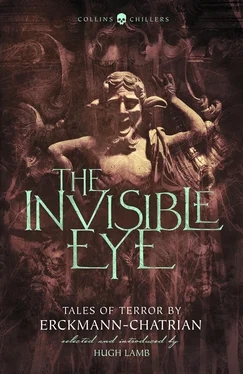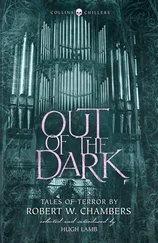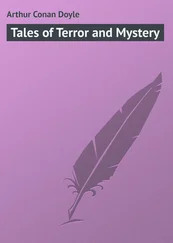1 ...8 9 10 12 13 14 ...23 ‘Ha,’ replied Rothan, ‘I should not have dared to say it, but you express things so well, Monsieur Organist, that one cannot disagree with you, especially in any matter that concerns yourself. As for my old friends Schultz, Ulmett, Klers, and the others, it is different, very different. Any one may at times be led astray by a dream, only one must see that it does not become a custom.’
Instead of answering to this direct attack, Blitz, his head bent down, seemed to be listening to some noise without.
‘Hush,’ said he, looking at us. ‘Hush.’
He lifted his finger, and the expression of his face was so striking that we all listened with an indefinable feeling of fear.
The same instant heavy steps were heard in the street without; a hand was laid on the catch of the door, and the organist said to us in a trembling voice: ‘Be calm – listen and see. Heaven be with us.’
The door opened and Saphéri Mutz appeared.
Should I live to be a thousand years old the figure of that man will never be erased from my memory. He is there – I see him. He advances reeling, pale – his hair hanging about his face – his eye dull, glassy – his blouse tight to his body – a big stick in his hand. He looks upon us without seeing us, like a man in a dream. A winding track of mud is left behind him. He stops, coughs, and says in a low voice, as if speaking to himself: ‘Well! what if they arrest me! What if they kill me! I would rather be here!’
Then, recollecting himself, and looking at us, one after another, he cried with a movement of terror: ‘I have spoken! What did I say? Ah! the burgomaster – the magistrate Ulmett.’
He made a bound as if he would fly, and I know not what he saw in the darkness of the night without which drove him once more from it into the room.
Theodore Blitz slowly arose. After he had looked at us, he walked up to Mutz, and, with an air of confidence, he asked him in a low voice, pointing to the dark street: ‘Is it there?’
‘Yes,’ said the man, in the same mysterious tone.
‘It follows you?’
‘From Fischbach.’
‘Behind you?’
‘Yes, behind me.’
‘That is so, it is surely so,’ said the organist, throwing another look upon us. ‘It is always thus. Well then, stop here, Saphéri; sit down by the fire. Brauer, go and look for the gendarmes.’
At the word gendarmes the wretched fellow grew fearfully pale, and seemed to think again of flight, but the same horror beat him back once more, and he sank down at the corner of a table, his head between his hands.
‘Oh! had I but known – had I but known!’ he moaned.
We were more dead than alive. The innkeeper went out. Not a breath was heard in the room. The old magistrate had put down his pipe, the burgomaster looked at me with a stupefied air. Rothan no longer whistled. Theodore Blitz, sitting at the end of a bench, looked at the rain streaking the darkness.
So we remained for a quarter of an hour, fearful all the time that the man would take it into his head to attempt to fly. But he did not stir. His long hair coiled from between his fingers, and the rain dripped from his clothes on to the floor.
At length the clatter of arms was heard without, and the gendarmes Werner and Keltz appeared upon the step. Keltz, darting a side glance at the man, lifted his great hat, saying: ‘Good evening, Monsieur Magistrate.’
Then he came in and coolly put the handcuffs on Saphéri’s wrists, while Saphéri covered his face with his hands.
‘Come, follow me, my son,’ said he. ‘Werner close up.’
A third gendarme, short and fat, appeared in the darkness, and all the troop set off.
The wretched man made no resistance.
We looked at one another’s pale faces.
‘Good evening, gentlemen,’ said the organist, and he went off.
Then each of us, lost in his own thoughts, rose and departed to his home in silence.
As for me, I turned my head more than twenty times before I came to my door, fearful that I should see the other that had followed Saphéri Mutz ready to lay its hands upon me.
And when at last, thank heaven, I was safe in my room, before I got into bed and blew out my light I took the wise precaution of looking under my bed to convince myself that it was not hidden there. I even said a prayer that it would not strangle me during the night. Well, what then? One is not a philosopher at all times.
II
Until then I considered Theodore Blitz as a species of visionary imbecile. His maintaining the possibility of holding correspondence with invisible spirits by means of the music composed by all the sounds of nature, by the rustling of the leaves, by the murmur of the winds, by the hum of the insects, had appeared to me very ridiculous, and I was not the only one in that opinion.
It seemed all very well to tell us that if the grave sound of the organ awoke in us religious sentiments, that if martial music swept us on to war, and the simple melodies led us into reveries, it was because the different melodies were the invocation of the genii of the earth, who came suddenly into our midst, acted on our organs, and made us participants of their own proper essence. All that, however, appeared to me to be very obscure, and I had never doubted that the organist was just a little mad.
Now, however, my opinions changed respecting him. I said to myself that man is not a purely material being, that we are composed of body and soul; that to attribute all to the body, and to endeavour to ascribe all significance to it, is not rational; that the nervous fluid, agitated by the undulations of the air, is almost as difficult to comprehend as the direct action of occult powers; that we know not how it is that even a mere tickling of our ears, regulated by the rules of counter points, excites in us a thousand agreeable or terrible emotions, elevates the soul to heaven, melts us, awakens in us the ardour of life, enthusiasm, love, fear, pity. No, the first theory was not satisfactory. The ideas of the organist appeared to me more sublime, more weighty, more just, and more acceptable, looking at things all round.
Then how could one explain, by means of mere nervous sensation, the arrival of Saphéri Mutz at the inn; how could one explain the terror of the unhappy man, which forced him to yield himself up; and the marvellous foresight of Blitz when he said to us: ‘Hush! Listen! He comes! Heaven be with us!’
In the end all my prejudices against an invisible world disappeared, and new facts occurred to confirm me in this fresh manner of thinking.
About five days after the scene I have described, Saphéri Mutz had been transported by the gendarmes to the prison of Stuttgart. The thousand tales which had been set afloat respecting the death of Gredel Dick died away. The poor girl slept in peace at the back of the hill of the Trois-Fontaines, and folk were busied in looking after the wine harvest.
One evening about nine o’clock, as I left the great warehouse of the custom-house – where I had been tasting some samples of wine on behalf of Brauer, who had more confidence in my judgment in such a matter than in his own – my head a little heavy, I chanced to direct my steps towards the great Alley des Plantanes, behind the church of Saint-Landolphe.
The Rhine displayed to my right its azure waters, in which some fishermen were letting down their nets. To my left rose the old fortifications of the town. The air began to grow cool; the river murmured its eternal song; the fir trees of the Black Forest were softly ruffled; and as I walked on the sound of a violin fell on my ear.
I listened.
The black-headed linnet never threw more grace, more delicacy, into the execution of his rapid trills, nor more enthusiasm into the stream of his inspiration. It was like nothing I had heard. It had no repose, no measure. It was a torrent of notes, delirious, admirably symphonising, but void of order or method.
Читать дальше












